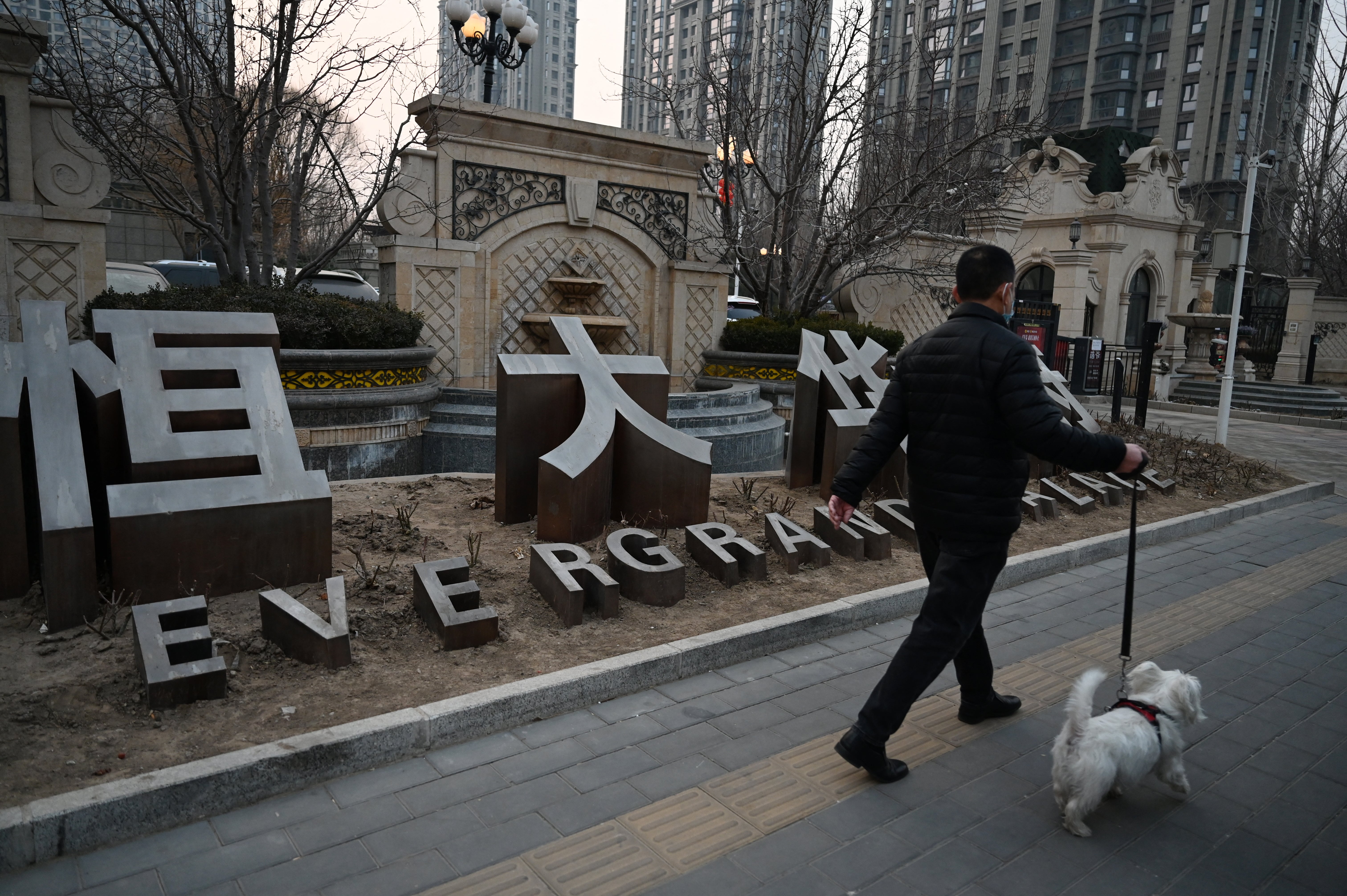Business
How the fall of Evergrande spells doom for China’s property market

The shares of China’s most indebted property giant Evergrande have been taken off the Hong Kong stock market, marking the end of its life as a publicly traded company that symbolised the rise and fall of China’s real estate industry.
Valued at more than $50 billion (£37.1bn) at its peak, Evergrande was China’s biggest property firm. But it became the poster-child for the problems facing Chinese developers after it collapsed under the weight of massive debts in 2021.
“Evergrande’s demise highlights that no private company in China is too big to fail,” Julian Evans-Pritchard, Head of China Economics at Capital Economics told The Independent.
“But the fact that it has taken this long for the company to be delisted underscores the slow-motion nature of China’s property adjustment, with state intervention preventing a more abrupt resolution.”
Evergrande’s 2021 default on offshore bonds led to its shares being suspended in January 2024, after a Hong Kong court ordered liquidation when years of restructuring talks failed.
Last week, the stock exchange confirmed it would cancel the listing because the firm failed to meet the requirement to resume trading within 18 months.
It comes as China’s economy is grappling with a series of challenges, including Trump’s tariffs, weak consumer spending, unemployment, high local government debt and an ageing population.
Experts say the collapse of the property sector has hit the country hardest, as it accounted for roughly a third of China’s economy and provided crucial revenue for local governments.
“It is a symbolic moment given that Evergrande was the first major casualty of China’s property downturn,” Mr Evans-Pritchard said. “The delisting itself won’t have a big impact given that the company’s market capitalisation had already collapsed and trading in the stock was suspended last year.”
“Although the company is being wound down, work on its projects is generally still ongoing, with local governments stepping in to make sure buyers eventually get the homes they bought.”
The company’s fall was as dramatic as its rise. Its founder, Hui Ka Yan, went from living a humble rural life to becoming one of Asia’s richest men.
Evergrande’s growth reflected the debt-fuelled nature of China’s property sector, which expanded rapidly following urbanisation and economic reforms in the 1990s.
Its 2009 listing marked a pivotal moment in that surge, with the company borrowing an unprecedented $20bn on international bond markets.
But the $45bn fortune that put Mr Hui at the top of the Forbes list of wealthiest men in Asia plummeted to less than $1bn.
By March 2024, Mr Hui was banned from China’s capital market for life over Evergrande’s overstating of its revenue by $78bn and he was fined $6.5m.
At the time of its collapse, Evergrande had an empire of 1,300 projects under development across 280 cities, an electric car business and Guangzhou FC. Earlier this year, China’s most successful team was itself kicked out of the football league due to debt.

Built on more than $300bn of borrowed money, Evergrande struggled to meet interest payments after Beijing introduced borrowing limits for developers in 2020.
Deep discounts on properties failed to prevent defaults on overseas debt, ultimately triggering liquidation.
The crisis wiped more than 99 percent from it stock market valuation.
Earlier this month, liquidators Alvarez & Marsal said they have so far recovered just $255m of assets, including a Claude Monet painting, out of the $45bn debt.
They also launched action against the firm’s auditors PwC China after authorities last March said it approved accounts despite inflated revenues in 2019 and 2020.
The housing crisis in China is far from over, with property firms like Country Garden still battling massive debt. Earlier this month China South City Holdings became the largest developer to be forced into liquidation since Evergrande.
“We think the property downturn is likely to continue for at least a couple more years, given that it will take time for the market to fully absorb excess supply as the backlog of unfinished projects are completed,” added Mr Evans-Pritchard.
Beijing launched a range of measures to revive the housing market and consumer spending, including incentives for new homeowners, stock market support, and purchases of electric cars and household goods.
Despite these efforts, China’s growth has slowed to around 5 percent, about half the rates seen in 2010.
Business
D-St blues! Sensex sheds 1.5K, biggest drop on a Budget day – The Times of India

At a time when global markets are witnessing high volatility due to geopolitical uncertainties, the hike in securities transaction tax (STT) on derivatives trades hit investor sentiment on Dalal Street on the Budget day. This in turn led to a sharp sell-off that pulled the sensex down by nearly 1,500 points—its biggest points loss on a Budget day—to close at 80,773 points. The sell-off also left investors poorer by Rs 9.4 lakh crore, the biggest Budget day loss in BSE’s market capitalisation.The day’s trading was marked by high volatility. The sensex rallied over 400 points as FM started her speech, fell about 1,100 points after the STT hike proposal was announced, partially recovered by mid-session to trade 600 points down on the day and then sold-off to close below the 81K mark for the first time in four months.On the NSE, Nifty too treaded a similar path to close 495 points (2%) lower at 24,825 points. Fund managers and market players feel the day’s sell-off was overdone, compounded by the absence of most institutional players since it was a Sunday. “The market’s reaction (to the hike in STT rates) was a bit overdone, although the decision itself was unexpected,” said Taher Badshah, President & Chief Investment Officer, Invesco Mutual Fund. “I think markets should settle down in 2-3 days.” Badshah said the Budget was in line with govt’s set path of the past few years, showing a conservative approach to setting targets.“The revenue and expenditure targets for FY27 are achievable. And since the rate of inflation is lower now, the nominal GDP growth rate of 10% may turn out to be on the higher side as inflation normalises during the year,” the top fund manager said. In Sunday’s market, of the 30 sensex stocks, 26 closed in the red. Among index constituents, Reliance Industries, SBI and ICICI Bank contributed the most to the day’s loss. Buying in software services majors Infosys and TCS cushioned the slide. In all, 2,444 stocks closed in the red compared to 1,699 that closed in the green, BSE data showed.STT hike aimed at curbing F&O speculation The decision to raise securities transaction tax (STT) for trading in equity derivatives means trading futures & options (F&O) will be more expensive from April 1. STT on futures trading rises from 0.02% to 0.05% now, and on options premium and exercise of options to 0.15% from 0.1% and 0.125% respectively. This could more than double statutory costs of trading F&O contracts.While the move is to curb excessive speculation by retail traders who mostly suffer losses, investors sold stocks of those companies that derive a large portion of their turnover from this segment. Stock price of Angel One crashed nearly 9%, BSE crashed 8.1%, Billionbrains Garage Ventures that runs the Groww trading platform, lost 5.1% and Nuvama Wealth Management lost 7.3%. STT hike follows a Sebi survey that showed that 91% of the retail investors lost money in the F&O market with average loss per investor surpassing Rs 1 lakh per year. Institutional and some high net worth players took home most of the profits from the segment.18% GST on brokerage for FPIs removedThe Budget proposed to do away with 18% GST charged on the brokerage that foreign portfolio investors pay in India. Among the host of changes to the GST laws that the finance minister proposed, one was abolishing clause (b) of sub-section (8) of section 13 of the Integrated Goods and Services Tax Act, 2017. This is being “omitted so as to provide that the place of supply for ‘intermediary services’ will be determined as per the default provision under section 13(2) of the IGST Act,” the Budget proposal said.
Business
Buying property from NRIs? Time to lose the TAN – The Times of India

Buying property from an NRI? Worried about obtaining TAN? Not anymore. To relax the compliance burden, the Budget has proposed that resident individuals and HUFs need not have a Tax Deduction and Collection Account Number (TAN) if they are purchasing a property from a non-resident Indian (NRI). The amendment will take effect from Oct 1, 2026.Under the proposed framework, resident individuals or HUFs can report the tax deducted at source (TDS) by quoting PAN, as is done when the transactions are between two residents. Presently, if a person buys an immovable property from a resident seller, the person is not required to obtain TAN to deduct tax at source. However, where the seller of the immovable property is a non-resident, the buyer is required to obtain TAN to deduct tax at source.Ameet Patel, partner at Manohar Chowdhry & Associates, said this used to be a detailed process. “At present, if a resident were to purchase an immovable property from an NRI, there is no separate relaxation regarding compliance with TDS responsibilities. As a result, in such cases, the buyer needs to obtain a TAN, register on the portal, and then deduct TDS u/s. 195, and pay to the govt. Under section 195, as with all other regular TDS sections, a quarterly e-TDS statement is required. A buyer would need professional help for all this.”Hinesh Doshi, CA, welcomed the move. “There used to be an unnecessary compliance burden due to this. While the process to obtain TAN is simple, people used to obtain TAN for just one transaction. So, this is a good riddance.”
Business
Harry Styles and Anthony Joshua among UK’s top tax payers

The former One Direction member-turned-solo artist appears on the Sunday Times list for the first time.
Source link
-

 Sports5 days ago
Sports5 days agoPSL 11: Local players’ category renewals unveiled ahead of auction
-

 Entertainment5 days ago
Entertainment5 days agoClaire Danes reveals how she reacted to pregnancy at 44
-

 Fashion1 week ago
Fashion1 week agoSpain’s apparel imports up 7.10% in Jan-Oct as sourcing realigns
-

 Business6 days ago
Business6 days agoBanking services disrupted as bank employees go on nationwide strike demanding five-day work week
-

 Tech1 week ago
Tech1 week agoICE Asks Companies About ‘Ad Tech and Big Data’ Tools It Could Use in Investigations
-

 Sports5 days ago
Sports5 days agoCollege football’s top 100 games of the 2025 season
-

 Politics1 week ago
Politics1 week agoFresh protests after man shot dead in Minneapolis operation
-

 Fashion1 week ago
Fashion1 week agoTurkiye cuts benchmark rate to 37%, flags confidence on inflation






